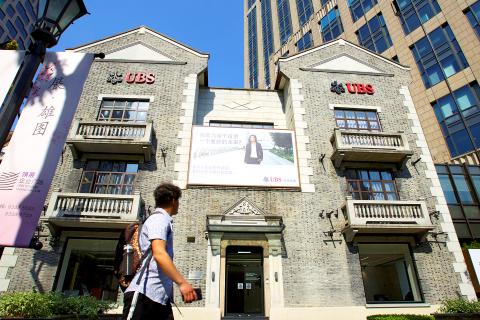UBS AG has lost a lead role on a US dollar bond deal for state-backed China Railway Construction Corp (CRCC, 中國鐵建), just days after a Chinese outcry over a senior UBS economist’s use of “pig” in connection with Chinese food price inflation.
While UBS apologized for the remark on Thursday and put the analyst on leave on Friday, the furor led Haitong International Securities (海通國際證券), a leading Chinese brokerage, to suspend all business with the Swiss group as some Chinese bankers and analysts criticized the bank for a lack of cultural awareness.
Yesterday, a spokesman at Chinese infrastructure giant CRCC that confirmed it had dropped the Swiss banking giant from the deal, but did not give a reason.

Photo: Reuters
The decision was taken because of the controversy over the pig comment, according to a source at the bank, who declined to be named as he was not authorized to talk to media.
A UBS spokesman declined to comment.
The upset stemmed from a remark by Paul Donovan, global chief economist at UBS’ wealth management business since 2016, in a podcast on Wednesday, which was then transcribed and posted on the bank’s Web site. It has since been taken down.
In the podcast, Donovan said that consumer prices in China had risen mainly due to sickness among pigs.
“Does this matter? It matters if you are a Chinese pig. It matters if you like eating pork in China,” Donovan said in comments some took offense at because of a perceived reference to people, not livestock.
The fierce outcry has taken many other Western banks by surprise.
In at least two Wall Street institutions bankers said their colleagues were discussing which words they should avoid following the UBS pig furore.
UBS analysts have also been asked informally by managers to be very careful about the use of words when referring to China or Chinese entities, sources with knowledge said.
“One of our economists came to me and asked me if we should prepare a list of words that we should always avoid mentioning in China-related reports. I thought he was joking, but he was serious,” one senior banker said.
The row came as global investment banks are gearing up for a push into China following rule changes that allow them to control their securities joint ventures.
UBS was the first in November last year to win approval under the rule changes. In March, JPMorgan Chase & Co and Japan’s Nomura Holdings Inc also got the nod.
“You can’t ignore the timing of this controversy — foreign brokerages are looking for a bigger footprint in China and the local houses are beginning to get worried about the impact of that on their market share. So they are not going to miss any excuse to go after the foreigners,” said a banker whose employer has been approved for 51 percent control.

GEOPOLITICAL ISSUES? The economics ministry said that political factors should not affect supply chains linking global satellite firms and Taiwanese manufacturers Elon Musk’s Space Exploration Technologies Corp (SpaceX) asked Taiwanese suppliers to transfer manufacturing out of Taiwan, leading to some relocating portions of their supply chain, according to sources employed by and close to the equipment makers and corporate documents. A source at a company that is one of the numerous subcontractors that provide components for SpaceX’s Starlink satellite Internet products said that SpaceX asked their manufacturers to produce outside of Taiwan because of geopolitical risks, pushing at least one to move production to Vietnam. A second source who collaborates with Taiwanese satellite component makers in the nation said that suppliers were directly

Top Taiwanese officials yesterday moved to ease concern about the potential fallout of Donald Trump’s return to the White House, making a case that the technology restrictions promised by the former US president against China would outweigh the risks to the island. The prospect of Trump’s victory in this week’s election is a worry for Taipei given the Republican nominee in the past cast doubt over the US commitment to defend it from Beijing. But other policies championed by Trump toward China hold some appeal for Taiwan. National Development Council Minister Paul Liu (劉鏡清) described the proposed technology curbs as potentially having

EXPORT CONTROLS: US lawmakers have grown more concerned that the US Department of Commerce might not be aggressively enforcing its chip restrictions The US on Friday said it imposed a US$500,000 penalty on New York-based GlobalFoundries Inc, the world’s third-largest contract chipmaker, for shipping chips without authorization to an affiliate of blacklisted Chinese chipmaker Semiconductor Manufacturing International Corp (SMIC, 中芯). The US Department of Commerce in a statement said GlobalFoundries sent 74 shipments worth US$17.1 million to SJ Semiconductor Corp (盛合晶微半導體), an affiliate of SMIC, without seeking a license. Both SMIC and SJ Semiconductor were added to the department’s trade restriction Entity List in 2020 over SMIC’s alleged ties to the Chinese military-industrial complex. SMIC has denied wrongdoing. Exports to firms on the list

SPECULATION: The central bank cut the loan-to-value ratio for mortgages on second homes by 10 percent and denied grace periods to prevent a real-estate bubble The central bank’s board members in September agreed to tighten lending terms to induce a soft landing in the housing market, although some raised doubts that they would achieve the intended effect, the meeting’s minutes released yesterday showed. The central bank on Sept. 18 introduced harsher loan restrictions for mortgages across Taiwan in the hope of curbing housing speculation and hoarding that could create a bubble and threaten the financial system’s stability. Toward the aim, it cut the loan-to-value ratio by 10 percent for second and subsequent home mortgages and denied grace periods for first mortgages if applicants already owned other residential